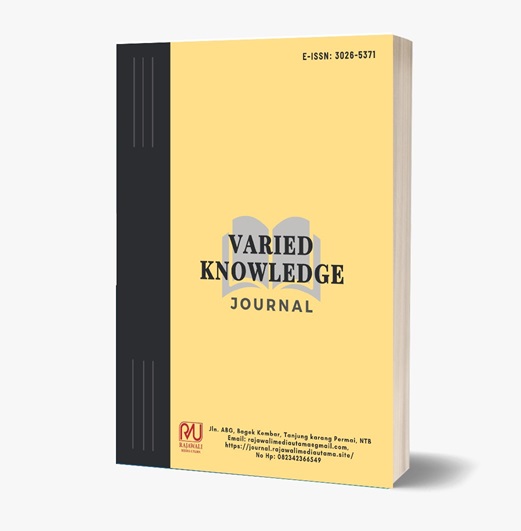Demokrasi Pendidikan pada Tataran Makro dan Mikro
DOI:
https://doi.org/10.64070/vkj.v1i1.5Keywords:
Democracy Education, Macro, MicroAbstract
Covid-19 is the SARS-COV virus that has attracted the attention of many people, including the Indonesian government. This slow virus has since become a panic-inducing pandemic. Various information spread and the increasing number of fatalities has an impact on various social situations. Covid-19 does not only have an impact on health aspects but paralyzes every aspect of people's lives. The magnitude of the influence of the Covid-19 virus gave birth to various social phenomena among the community. Anxious and fearful attitudes have influenced people's mindsets and ways of acting. Covid-19 has given rise to new social phenomena, ranging from anti-social behavior to various efforts made by the community in fighting COVID-19. There are various scientific, non-scientific, to spiritual practices carried out by the community with the aim of avoiding the Covid-19 virus. Based on the social situation, this paper seeks to examine the critical attitude of society towards social phenomena in the reflection of the philosophy of science. The method used to study this phenomenon is the literature study method. Based on the study, it was argued that society needs to address various social phenomena critically and responsibly so that the decisions taken are not biased and do not have a negative impact on social life. A critical attitude is needed in filtering various circulating people's mindsets and ways of acting. Covid-19 has given rise to new social phenomena, ranging from anti-social behavior to various efforts made by the community in fighting COVID-19. There are various scientific, non-scientific, to spiritual practices carried out by the community with the aim of avoiding the Covid-19 virus. Based on the social situation, this paper seeks to examine the critical attitude of society towards social phenomena in the reflection of the philosophy of science. The method used to study this phenomenon is the literature study method. Based on the study, it was argued that society needs to address various social phenomena critically and responsibly so that the decisions taken are not biased and do not have a negative impact on social life. A critical attitude is needed in filtering various circulating information so that you don't become a victim of misinformation. Every decision taken must be made critically so that it is beneficial and has a positive effect on social life.
References
Arwildayanto, Suking, A., & Sumar, W. T. (2018). Analisis kebijakan pendidikan: Kajian teoretis, eksploratif, dan aplikatif. CV Cendekia Press.
Astawa, I. N. T. (2017). Memahami peran masyarakat dan pemerintah dalam kemajuan mutu pendidikan di Indonesia. Jurnal Penjaminan Mutu Lembaga Penjaminan Mutu Institut Hindu Dharma Negeri Denpasar, 3(2), 197-205.
Budimansyah, D. (2008). Peningkatan mutu pendidikan melalui penguatan partisipasi masyarakat. Educationist, 2(1), 56-63.
Fathorrahman. (2020). Demokratisasi pendidikan dalam pendidikan Islam. Ilmuna, 2(1), 36-47.
Masykur. (2019). Teori dan telaah pengembangan kurikulum. CV. Anugrah Utama Raharja.
Mukodi. (2016). Bilik-bilik demokrasi dalam pendidikan. Shahih, 1(2), 113-123.
Nurhasanah. (2017). Peran masyarakat dalam lembaga pendidikan. Fondatia: Jurnal Pendidikan Dasar, 1(1).
Peran guru dalam pengembangan kurikulum. (n.d.). Retrieved from http://pai.ftk.uin-alauddin.ac.id/artikel/detail_artikel/240
Pusposari, D. (2017). Pendidikan yang demokratis dalam era global. Paper presented at the Seminar Nasional, PS PBSI FKIP Universitas Jember.
Republik Indonesia. (2003). Undang-Undang Republik Indonesia Nomor 20 Tahun 2003 tentang Sistem Pendidikan Nasional.
Rosyad, A. M. (2019). Implementasi nilai-nilai multikulturalisme melalui pembelajaran pendidikan agama Islam. Risâlah: Jurnal Pendidikan dan Studi Islam, 5(1), 1-18.
Rosyad, A. M. (2020). Paradigma pendidikan demokrasi dan pendidikan Islam dalam menghadapi tantangan globalisasi di Indonesia. Nazhruna: Jurnal Pendidikan Islam, 3(1), 75-99.
Rosyada, D. (2004). Paradigma pendidikan demokratis: Sebuah model pelibatan masyarakat dalam penyelenggaraan pendidikan. Prenada Media.
Sarnoto, A. Z. (2012). Dinamika pendidikan nasional dalam perspektif politik pendidikan. Educare, 2(1), 62-73.
Sauri, S. (n.d.). Strategi pembangunan bidang pendidikan untuk mewujudkan pendidikan bermutu. Retrieved from http://file.upi.edu/Direktori/FPBS/JUR._PEND._BAHASA_ARAB/195604201983011-SOFYAN_SAURI/makalah2/STRATEGI_PEMBANGUNAN_BIDANG_PENDIDIKAN_revisi.pdf
Sihono, T. (2011). Upaya menuju demokrasi pendidikan. Jurnal Ekonomi dan Pendidikan, 8(1), 1-22.
Somantri, M. (2014). Perencanaan pendidikan. PT Penerbit IPB Press.
Sumarsono. (2012). Menjadi guru profesional berkarakter. Lembaga Penerbitan Universitas Kanjuruan Malang.
Suprihatiningrum, J. (2013). Strategi pembelajaran. Ar-Ruzz Media.















